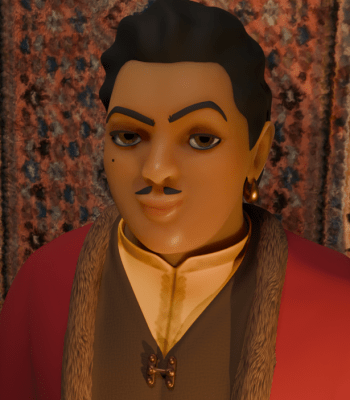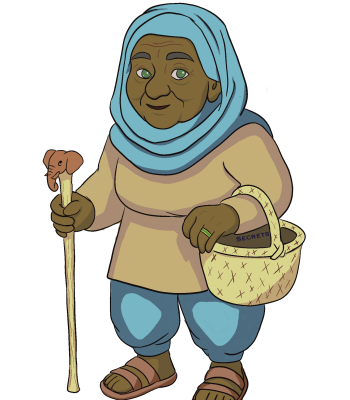tldr: Fan talks too much.
---
Some thoughts (I reserve the right to have others later!):
Trying to match the rhythm of the scene you're in is a low threshold, high ceiling activity, where most everyone realizes it is worth attempting, but getting really good at it can be a lifelong journey. I think it is the essential purpose of this thread, and of emoting guidelines in general. I also think it's important to separate this consideration from concepts of "style" or "writing style" or "my style" because those are the notions that cause us to become precious and self protective, and to not want to consider doing things differently than we already do them - which precludes us from ever improving at how we collaborate.
Some things that seem relevant, to me, from my experience, below. (People intuitively know many of the things I'm going to say but I think it's worth spelling them out in order to practice dissecting these concepts, and to build a common vocabulary for discussing them.)
First:
I think the debate between "rules" and "guidelines" is a bit of a category mistake, personally. People get upset at the idea of being "forced" to do something by a "rule", and they feel comfortable with "guidelines" mainly because they are free to ignore them if they aren't immediately appealing. I don't think either of these approaches is the point, really. The point is that none of us is writing a book by logging into the MUD (although we can in our story arc! enjoy!); we are participating in a collaborative activity with other players. Yes, this is a particular type of collaborative activity, distinct from other similar types of activities, and the people who are building the world have (and should have) the opportunity to say what sort of activity that is intended to be, and to build mechanics to support that. But at its core it's much simpler than that, and mostly style-independent.
There are tools and practices which make effective and satisfying collaboration easier for everyone - and for the people struggling the most - and there are habits and practices that make collaboration harder. No one was born knowing what these are. We all have a certain intuition about many of them, from our experience playing these types of games. But it's worth discussing them, and discussing what works *particularly well in this specific context*, so that we can all have a mutual baseline of best practices to be starting from, or so that we can negotiate sticky situations as a community, if they arise.
Best practices aren't laws; no one is going to arrest you for putting your hand on the wrong part of the table saw. You might cut it off, though. Which is probably counter to your goals for table saw usage. ;)
On Emote Length
There are different types of "long" emotes, and they are differently in/appropriate in different situations.
* Long descriptive emotes are perfectly fine (IMO) in a medium-density (4-6 players) scene, because they do not create multiple dialogue or action hooks for everyone to juggle, and occupy the same amount of virtual time as a social. People may skim the loving description if they can't process fast enough, but that is largely only detrimental to the person who wrote it, so it's not a huge problem. If you want to talk about how you pushed your hair behind your ear for three lines, it's no skin off my nose.
These are not ideal in high-density (7+ players) scenes, because spam. If you can say it in one line, everyone will appreciate it, and they are more likely to respond appropriately because they are more likely to have actually read it.
* Multi-action or speechifying emotes are a completely different animal. It is useful to be mindful of how much virtual time these emotes take up, and compare that to how much virtual time the other emotes in the scene are taking up. In a medium-density scene, these should be avoided if at all possible. It's fine to be writerly, but taking up a lot of virtual time and giving the person who is writing *at the same time as you* *even more* to respond to after you hit enter before them is very problematic for establishing a group rhythm. It also risks you getting behind and just adding more and more and more clauses and actions as you feel obligated to acknowledge everything that has happened in the last 10 minutes in one giant emote. It's also very disruptive to the people who come AFTER you, who may feel they need to respond to everything you've just done in their own emote or else ignore you completely. Who is doing what when becomes very unclear very quickly here.
If you have 7 actions/dialogue responses in one emote, you can write 7 emotes. Then it will be clear when they happened, and people can respond to them in the time they emerge, naturalistically. The issue here is not one of writing style, but of recognizing that time in the MUD is REAL. It passes - whether you are acting or not. And if you claim to do 12 things in one second, it's awkward for everyone who has to decide on the fly how on earth to relate to that. Moreover, there are action situations where time is passing and mechanical things are happening, and trying to respond in this way will hinder everyone's ability to act in rhythm with the mechanics of the game world.
* Because none of this is an issue of style, but rather of practicality, what you do in a low density (1-3 player) scene is almost completely a matter of taste. It often makes sense to slow time down a bit in these types of scenes, and under most circumstances there's no reason not to do that. Obviously if someone needs life-saving intervention or similar, reverting to time-sensitive emoting practices is probably best. Otherwise, whatever works for all players involved is probably fine.
On Speed
* On the subject of things working for all players involved, it's courteous to try to maintain an awareness of one's time usage, and how it may be affecting other players. If someone seems to be struggling to respond in time to everything that is happening, it may be a good idea to include fewer actions or details to accommodate them - to cover a smaller span of time with your emotes, or emote less frequently per a given a span of time. This way a person who types more slowly or has a harder time processing information can manage smaller chunks at a time, and will be less likely to get talked over. When you're playing with someone who responds more quickly, it's fine to speed up again, of course.
* By the same token, MUD time is real time - you don't have to wait for people who are distracted or AFK or very slow, if time-sensitive events are occurring. I personally think it's courteous to wait a little while, but if the bomb is going off in 57 seconds, the bomb is going off in 57 seconds. If necessary, descriptive context can be back-filled later.
On Subjectivity
* Personally I have a fair bit of tolerance for people including thought-like subjectivity in their emotes, although the games I started on considered this to be Out Of Bounds. But as someone who often (read: always) plays characters from the margins outside typical social norms, I do find it extremely grating when people tell me, even implicitly, what my character's reaction to something "is" (usually by implying that a certain reaction would be universal), mostly because it's never actually true of my character. This is something to keep in mind. I think most people would say "I totally agree, and would never do that!" but it can sneak up on us: when it's something we take for granted, and think "everyone" "agrees" about, we often don't see it as subjective. Socially marginal characters can do this as well, when telling everyone how objectionable their antics "are". When you look closely, what may seem like a stylistic choice can be experienced by others as a subtle type of force pose.
* That said, too much description of the whys and wherefores behind a character's action create conundrums in which my character doesn't know this, because he's not psychic, but I do know it, so I'm no longer curious. Also, it's very hard to keep straight all of the small discrepancies between what I know and what my character knows. Odds are I just won't pursue asking why a character flew off the handle, if you told me about it in the emote description. This is regrettable, I think. Also, someone else may make a different choice, and feel that they DO know why that happened, and we're suddenly living in fractured timelines, where our senses of what Happened and what is Real don't line up. Jane is suddenly mad at Pedro because he isn't giving Julie a break when her throwing the china was obviously an understandable reaction to her miscarriage. Pedro doesn't know that! And frankly, neither does Jane. And wouldn't it be more interesting if they had these actual conversations instead of just feeling weird toward one another and out of sync and awkwardly failing to get along going forward?
Anyway, these are not guidelines. They are just some observations, from my time in the MU*sphere.
Edited to add:
Erm also I realize I didn't think to add - this post assumes from the outset that we all agree that being courteous is a good thing, and something we want to try to improve at. It does not address Behaving Badly or acting in Bad Faith because I don't think those are issues to be addressed by community guidelines. If someone needs to be told that being a jerk is against the rules, they are a bad fit already, I would very much hope?
Edited again to add:
From Pilgrim:
I'm kind of curious what people think when they read 'improv acting' and/or 'collaborative writing'...
The collaborative writing style:
I'm speculating here, but I suspect that in MUSHes, or perhaps in games where roleplay happens outside of the normal game mechanics, during downtime, or the like, there is, perhaps, a feeling of elastic time, and every character's time is their own. I may have said I did 12 things, and in my mind this took 12 minutes, while Joe and Judy each did 1 thing, which took 1 minute each, and these two incompatible facts just exist side by side, without any real sense of conflict. I'm TELLING a story about my character first, and interacting with Joe and Judy as virtual people second. I take what time I need, and I consider each character's story (when I am the audience) independently. In a high stakes character development scene between me and my paramour, we may sync up and get into a rhythm but the rest of the time I don't worry about this.
The improv style:
This style is not about TELLING, it's about BEING. I AM my character, and I have a moment-by-moment *experience* of all the things you say you did, or I should have, if you tell them to me one by one. I should have 15 things to say about your 15 things. If you stack them all together it prevents me from having my organic experience. The rhythm is experience, describe, experience, describe. Not experience, experience, experience, experience, describe describe describe describe. The telling is not the end in itself, it is a means, it's how I communicate to you what I am feeling and doing. More like LARP in words, less like forum RP.
Or something. 8)









